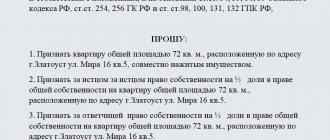In the marriage contract and separation agreement, the spouses state the agreements they have reached in the area of property relations. The main similarity between these two types of transactions lies in the regulation of property relations during marriage and (or) upon its dissolution. However, there are many more differences between them. How prenuptial agreements differ from agreements on the division of property and what is better suited for the specific situation of the spouses will be described below.
The concept of a marriage contract and an agreement on the division of property
In jurisprudence, a marriage contract is understood as a transaction between a wife and husband or between persons planning to register a marriage. In the contract, they delineate responsibilities and rights in the property sphere for the duration of the marriage and, if desired, determine the procedure for dividing marital assets in the event of a divorce. An agreement can regulate not only the conditions for the use and disposal of joint property, but also the conditions for the use and disposal of the individual property of the spouses.
An agreement on the division of property is a transaction that can only be concluded by spouses or ex-spouses.
In the agreement, the specified persons distribute the common joint property that they acquired after the marriage and before the day of divorce.
The essence of the contract
According to the legislation of the Russian Federation, a husband and wife have several options for dividing property. The first is a judicial one, it is prescribed in the Family Code and is used in cases where the parties fail to reach an agreement on financial issues. The second is the contractual regime, where all the conditions are specified in the agreement between the husband and wife, which they decided to officially conclude. Therefore, many couples begin to draw up a marriage contract in order to avoid quarrels in the future. It can indicate how the spouses will divide the jointly acquired property.
The structure and content of the agreement are determined by the two parties. They must comply with the legislation of the Russian Federation. For example, there are certain rules and conditions that are not specified in the agreement, and therefore are not taken into account when concluding a contract. This section includes:
- prohibiting one of the couple from filing an application with the judiciary;
- voluntary consent of the couple to sign such a document;
- absence of sections that contradict the law;
- official certification of the finished paper by a notary.
The submitted document must be in writing and must be notarized. Both parties are required to comply with all the details of registration, and the task of the representative of the notary’s office is to confirm the couple’s voluntary consent to enter into an agreement.
What to choose: pros and cons
| Trade name | Behind | Against |
| Marriage agreements | It is better to conclude an agreement in cases where:
| You should refuse to enter into a marriage contract:
|
| Partition agreements | It is suitable for those spouses or former spouses who:
| You should refrain from concluding a separation agreement:
|
Basic Concepts
According to the law, everything acquired during the marriage belongs to both spouses equally. And it will be divided equally upon divorce. There are 2 ways to do this:
- Peacefully - citizens agree among themselves and enter into a special agreement according to which common property will be distributed.
- Through the court - if it is impossible to reach an agreement, the disputes between the spouses will be resolved by the court.
The first option has priority. It is much easier and faster to resolve the issue on your own; here people are not limited by time or capabilities. They can enter into an agreement on the division of common property during the marriage, during the divorce process, or after, depending on the situation. Or think through everything in advance by drawing up a prenuptial agreement before the wedding. Both forms of transaction are voluntary and there are significant differences between them.
Property division agreement
In the provisions of family law, an agreement on the division of property of spouses is described as a transaction carried out during divorce proceedings (Article 38 of the RF IC). However, people can resort to it earlier, even before the divorce, to save time and make the procedure easier. Let the law of common property apply to them; no one forbids discussing the context of a future transaction and drawing up an agreement in advance. On the contrary, if the divorce takes place in court, the statement of claim can mention the existence of an agreement. Then the question of division of property will not arise; the judge will take the document into account.
Property division agreements can be found here.
A settlement agreement on the division of property is a form of voluntary transaction concluded between two people. Regardless of whether they are married or not. This is the right of adult citizens to independently resolve their property issues, without involving the court or third parties. It is allowed even in case of cohabitation (running a joint household without official marriage). Contains basic provisions on the division of the common property of spouses - a detailed description of the objects of the transaction, their material valuation and ownership. Has features:
- may occur during marriage, during or after divorce;
- spouses have the right to include any property there, even personal, if they consider it necessary;
- Notarization of the document is required to gain legal force;
- has no limited validity period, unless otherwise indicated in the content.
It is an official document confirming the intentions of the parties. The division of property between spouses must be carried out in accordance with the terms of the agreement reached between them. The court takes it into account, obliging the parties to fulfill the obligations specified there.
Marriage contract
A marriage contract is a form of voluntary transaction between two people that regulates property relations between them while they are married (Article 40 of the RF IC). The law allows for the inclusion in the text of a document of conditions that will be relevant after the divorce. And in the process of divorce, the presence of a contract will significantly affect the state of affairs.
The main purpose of the document is to determine the mode of ownership of common property (Article 42 in the RF IC). Spouses have the right to independently change the procedure provided for by law and choose a shared form of ownership instead of common ownership. Decide in advance who can own what. Deal Features:
- is voluntary;
- it is possible to determine the fate of future property that does not exist on the date of compilation;
- often it is concluded before the wedding (Article 41 in the RF IC);
- reflects only the property relations between the parties;
- remains relevant after divorce;
- taken into account upon divorce.
Additional conditions regarding personal relationships, behavior or restrictions cannot be included in the marriage contract. It serves only as a tool for dividing the property of the spouses, both existing and what will appear in the future. Does not require registration with Rosreestr. If concluded before marriage, it becomes valid only after the wedding.
Subject of regulation
Marriage contract
The law includes the following as the subject of the contract:
The procedure for distributing family expenses, for example, which spouse will pay for food, minor home repairs, utilities, etc. If necessary, the wife and husband have the right to determine in the contract not only the category of expenses, but also their share in each category.- Changing the matrimonial property regime established by law. Spouses independently determine for which specific property assets they will establish a different regime, for example, separate or shared. This could be, for example, all property, personal belongings of each spouse, certain categories of property (household appliances) or an individually defined item (Asus laptop).
- Responsibilities for financial support of any of the marital partners during an existing marital relationship or after its dissolution.
- Establishing obligations and rights in relation to property assets that will be acquired in the future.
- The ways in which spouses can participate in each other’s earnings, as well as the procedure for distributing these earnings between them.
- The procedure for dividing marital assets in the event of termination of the marital relationship.
- Other property obligations and rights.
Partition Agreement
The subject of this agreement is the definition of joint property acquired from the moment of marriage until the day the agreement enters into force or until the day of divorce, and its division, accompanied by the transfer of marital property into the personal property of each spouse or ex-spouse according to the shares or list of assets defined in the agreement . Any other issues cannot be settled by the separation agreement.
The Family Code determines that joint common property that can be divided is:
Real estate for any purpose.- Income of each spouse.
- Bank deposits.
- Securities.
- Shares in organizations and credit institutions.
- Movable property.
- Money received in the form of financial assistance, benefits and pensions.
- Money received from the use of intellectual property products created by one of the marriage partners.
- Units in mutual investment funds and other organizations.
The above property must be acquired during the marriage. For the law, it does not matter which spouse acquired it, in whose name the property right was registered, or with whose money the item was purchased.
Differences
To compare two forms of transaction with each other, you need to clearly see their similarities and differences. Spouses have the right to use any option, both are permitted by law. The only thing is that the agreement on the division of property is usually concluded later than the marriage contract. And it is used during divorce to simplify the procedure when the parties have already discussed everything.
| Criteria | Settlement agreement | Marriage contract |
| Form, need to notarize | Only written, notarized certification | Only written, you can do without a notary |
| Who concludes | Spouses/ex-spouses, cohabitants | Persons planning to marry/legal spouses |
| Moment of conclusion | Can be concluded during marriage, during divorce and after it | Can be concluded before marriage registration or at any time after the wedding |
| Selected ownership modes | A regime of common shared / separate ownership is established | Regime of common/common shared/separate property |
| Subject of the agreement | Property already owned | For current property and future |
| Other differences | It is possible to establish what goes to the common children by re-registering the object of the transaction to the children at a specified time. | Spouses can distribute financial obligations among themselves to support each other. Determine what and who gets it immediately after acquisition. |
| Distribution of debt obligations and other conditions | Includes only property relations of the parties |
Both forms of transaction contain the rights and obligations of the participants regarding joint property. It is necessary to take into account not only assets, but also debts, for example, an outstanding loan. During a divorce, you cannot “forget” it; you cannot simply divide it in two. Bank participation is required. If there are two borrowers and the spouses initially paid equally, then each will receive half of the collateral property after the final repayment of the mortgage. Until then, the formal owner is the bank.
Subject of regulation
The marriage contract applies to the current and future lives of the parties. According to the law, it can be used to regulate:
- Distribution of family expenses down to the smallest detail. For example, who pays for food, who pays for utilities, minor repairs and clothing. The cash register will be shared or everyone will manage their own income.
- Changing the regime of ownership of property of spouses described in the legislation. Participants in the transaction can decide which regime is most beneficial to them. For example, shared, or common. The rules will apply to everything purchased by the couple, from household appliances to real estate. You can specify the ownership category for each item separately. The apartment is shared, but the laptop is personal.
- Obligations for financial support of partners during marital relations and after divorce.
- Establishment of rights and obligations to dispose of property that exists and will be acquired.
- Methods for spouses to participate in each other’s business transactions, and the procedure for distributing earnings between them.
- How the family's assets will be divided in the event of a divorce, what will go to each party and what to the children.
- Other property rights and obligations.
The contract can only contain information of a material nature. For example, the right to own joint property, financial security for the family, payment of debts. There should be no other conditions in the contract, such as an obligation to remain faithful or change religion after the wedding.
The subject of the settlement agreement on the division of property is all assets acquired by the family during the period of legal marriage:
- real estate (residential and non-residential);
- bank deposits;
- spouses' income;
- shares in credit institutions and organizations;
- movable property (transport, furniture);
- securities;
- financial assistance - subsidies, pensions;
- income from intellectual activity of partners;
- shares from mutual funds/other organizations.
Except for those received as a gift or as an inheritance by one of the spouses. The other half can claim this if the gift or inherited property was subsequently improved with investment from the family budget. Then, through the court, the object can be recognized as part of the property acquired jointly. When dividing joint property by reaching a peaceful agreement, the parties decide for themselves what to divide and how. The donee or heir has the right to include what was received as a result of a gratuitous transaction into the common “cauldron” of his own free will.
Design features
The conclusion of a marriage contract between the parties is described in detail in the legislation. Stakeholders only need to follow the instructions and understand the importance of the decision being made:
- The parties to the transaction agree on the terms of the contract in detail. This happens before or after marriage.
- Preparation of a plan for a future agreement. You can draw it up yourself on paper, listing all aspects point by point. Or entrust it to an experienced lawyer.
- Collection of documents. To conclude a marriage contract, the parties will need:
- three copies of the finished document;
- marriage certificate (if the wedding has already taken place);
- title papers for the property described in the contract;
- passports of the parties;
- funds to pay for notary services.
It is not necessary to involve a specialist when drawing up and concluding a contract. However, it will help to avoid many difficulties, because the lawyer will check the legal compliance of the contract and certify it. At the same time, he will explain to the parties the significance of their actions.
- Choosing a suitable notary.
- Visit to a law office. A specialist will study the contract plan, help you finalize it, and check the attached documents. The parties will then sign the agreement in his presence.
On average, notary services cost 5,000 – 10,000 rubles, if it includes drawing up an agreement for the parties’ current property and what they will acquire in the future. An example of a marriage contract can be downloaded here.
The participation of a notary is not necessary, but rather desirable to ensure the legal purity and safety of the procedure.
The procedure for concluding an agreement on the division of joint property is in many ways similar to signing a marriage contract. The only thing is that after changes in legislation in 2021, the participation of a notary in the transaction has become mandatory:
- Citizens must visit a notary and show him the marriage certificate/divorce certificate to confirm their legal relationship.
- Together they work on the content of the document, which should reflect the intentions of the parties regarding the joint property acquired by them during the period of legal marriage.
- The specialist explains to clients the legal significance of their actions and the expected result. That the document will be taken into account by the judge, the division of property will take place according to the procedure established in it.
- If clients have not changed their mind, they sign the agreement in the presence of a lawyer, and he certifies the paper.
- You can pay for notary services in 2 ways:
- depending on the value of the subject of the transaction - 0.5%, if the total amount is less than 300 rubles, clients pay 300, if above 20,000 rubles, then pay - 20,000;
- fixed rate 5,000 – 15,000 rubles.
Some specialists set their own prices. It depends on the location of the office; in large cities it is more expensive.
Changes can be made to the content of the contract and agreement after signing and certification (if any). If both parties agree with them.
Legal force
The Family Code regulates the procedure for dividing the common property of spouses through the conclusion of a settlement agreement. The content of the regulations establishes the nuances of the procedure: the subject of the transaction (large items of great value, real estate, transport, financial savings), the time of conclusion (during the marriage, during divorce proceedings or after it) and the procedure for the distribution of property that will go to each of the spouses after divorce. The document acquires legal force after it is signed by the parties and certified by a notary. It is taken into account by the court.
A marriage contract can be drawn up without the presence of a lawyer, provided that all legal requirements are met. It acquires legal force after the wedding, if concluded earlier and immediately after signing by the parties, if married.
Arbitrage practice
Legal proceedings are initiated by one of the parties to the transaction when the other violates the terms. The second purpose is to invalidate the agreement. For example, under the terms of a prenuptial agreement, all assets acquired by a couple during marriage become the personal property of the spouse. The husband is left with nothing. At first, the man could agree, but later, after reflecting on the prospects, he wanted to make changes to the content of the agreement. However, the woman was against it. Such disputes are resolved through court, where the arguments of each side will be heard.
Having examined the case, the court ruled:
- If, according to the provisions of the contract, any assets acquired by the partners during the period of the marriage relationship are transferred to one of them, then he is the legal owner.
- The contract cannot be considered an enslaving deal that puts one of the participants in a deliberately unfavorable position.
- The plaintiff does not have evidence of his disadvantageous position as a result of the conclusion of the disputed contract.
- The deterioration of the plaintiff’s financial situation cannot be considered a “significant change in life circumstances.”
Experts advise contacting a notary when concluding transactions of this nature, because It is difficult for people to imagine the full consequences of the decisions they make. Especially in terms of a marriage contract, because it specifies the procedure for disposing of property by spouses not only for the current, but also for the future. The courts will always rely on the voluntary consent of the people who signed the agreement.
Distinctive features of the contract and agreement
The table below shows legal characteristics on the basis of which you can determine the similarities and differences between a marriage contract and an agreement on the division of property.
| Characteristics | Marriage agreements | Partition agreements |
| Purpose of the conclusion | Arrange or create for the future a model of property obligations and rights, which may differ from the model established by law. |
|
| Property | Already existing assets or assets that will be acquired in the future. | The spouses already have joint property. |
| Duration for which a deal can be concluded | Until the end of the marriage or until a specific date, or until the occurrence of a certain condition, for example, the birth of a child. Some provisions of the contract continue to apply after divorce, for example, the obligation to support the ex-spouse. | Until the obligations established by the agreement are fully fulfilled. |
| Parties to the transaction |
|
|
| Transaction form | Written with notarization. | Written with notarization. |
| Deal time |
|
|
| Compliance with the legal principle of equal shares | Not necessary. | Not necessary. |
| Property regime | You can change the property regime, including the regime of personal property of marriage partners, to any of the following:
| You can change the joint property regime to any of the following:
|
Responsibility of the parties
This section is intended to delimit responsibility for any issues. For example:
3. Both spouses are liable for obligations to the creditor within the limits of the shares of the property belonging to them. Moreover, if one of the spouses made a transaction in relation to common property without the consent of the second, then the latter, in turn, is not responsible for this.
Liability for harm caused to any family member may also be prescribed:
4. Each party is liable in accordance with the norms of Civil Law in case of harm to their minor children. The final provisions of the agreement provide information that each spouse is familiar with the contents of the agreement. The conditions for terminating or amending the contract are also specified.
There is a general rule that it is impossible to terminate a contract unilaterally. This fact is also stated in the final provisions. At the end of the contract, the spouses put their signatures, and the contract is considered concluded.
Circumstances and features of document preparation
The procedure for concluding a marriage contract is based on a clear algorithm of actions that must be followed in order to achieve the goal. This algorithm includes:
Agreeing on the terms and wording of a future contract between persons planning to enter into a marital union or between spouses.- Preparation of the text of the future agreement. You can do this yourself based on the template provided or entrust the preparation of the contract to a professional lawyer.
- Collection of necessary documents: Three copies of the printed agreement.
- Marriage certificate, if the marriage was officially registered.
- Documents for the property specified in the text of the contract.
- Passports of both parties to the transaction.
- Funds in an amount sufficient to pay for notary services. The amount that will need to be transferred to the notary should be found out in advance by calling or visiting the notary's office in person.
Drawing up a separation agreement, a sample of which can be viewed at this link, is practically no different from the procedure for drawing up a marriage contract, with the exception of the following nuances:
- The parties to the agreement must bring to the notary a marriage certificate if they are still spouses, or a divorce certificate if they are no longer spouses to each other.
- The full amount of payment can be calculated by the notary in 2 ways: Depending on the price of the divided property. 0.5% of the agreement price is paid. If the received tariff amount is less than 300 rubles, then clients pay 300 rubles. If the received tariff amount is above 20,000 rubles, then clients pay 20,000 rubles.
- Fixed rate. Some notaries use this method of calculating the payment amount. Typically, the price of notary services in this case ranges from 5,000 rubles. and up to 15,000 rub.
Validity
A properly drawn up marriage contract signed by the parties and certified by a notary has no expiration date. The conditions and clauses stated in it have no statute of limitations and are not limited to any time period. Spouses have the right to indicate the occurrence of a certain event or point in time, after which property will be distributed in favor of one of the parties or between them in a certain ratio. However, the contract itself is valid over time: from the moment it is signed and certified by a notary until the moment it is valid.
The conditions stated in the agreement between husband and wife can be canceled only by mutual consent of the parties, or in some cases, by court decision. This can be done both during the marriage and after its dissolution. If the parties agree that the situation has changed and the marriage contract is no longer valid, they have the right to terminate it at the notary. This can be done in court if one of the parties disagrees, but in the presence of compelling circumstances provided for by law.
Thus, a marriage contract can be annulled during a divorce or before it is finalized only with the consent of both parties. In this case, they can agree on a different procedure for distributing property. Termination of a contract by court is possible in exceptional cases upon the occurrence of circumstances that the parties could not take into account when drawing up the contract or others provided for by law.
Arbitrage practice
As a rule, disputes in courts regarding marriage contracts boil down to the fact that one participant in the transaction has violated his obligations enshrined in the contract, and the second participant demands to stop illegal actions. The second reason for litigation is the question of whether a contract is void or not.
Thus, in the Kirovsky District Court of Novosibirsk in September 2021, the court considered a case in which the husband demanded that the marriage agreement concluded between him and his wife be invalidated.
The essence of the requirements was that, under the terms of the agreement, all joint assets that the wife and husband acquired in the marriage union are transferred to the spouse. According to the husband, this fact puts him in a very unfavorable position compared to his wife.
The court examined the evidence presented during the hearing and came to the following conclusions:
- According to clause 3 of the marriage agreement, any assets that become the property of the marriage partners are considered to belong to the spouse in whose name the transaction is executed or in whose name the property is registered.
- Clause 10 of the same agreement establishes that this contract cannot be considered an enslaving transaction or put any of the spouses in a very unfavorable position.
- The plaintiff has no evidence that he is disadvantaged by the execution of the disputed contract.
- The plaintiff agreed to the signing of the contract and agreed to its terms, as evidenced by his signature.
- The deterioration of the financial situation of a party to the contract does not fall within the definition of the concept of “significant change in life circumstances.” This is due to the fact that by showing care and prudence in behavior, a person has the opportunity to anticipate possible risks that could lead to financial losses.
Thus, the claim was rejected and the contract was declared valid.
Disputes over a separation agreement typically arise when one party, after entering into the agreement, is not satisfied with its terms. In September 2021, the Zheleznodorozhny District Court of Rostov-on-Don was considering a case to invalidate the division agreement.
The plaintiff's claims were as follows:
Shortly before signing the agreement at the notary, her husband severely beat her. As a result, she was scared, humiliated and in pain. However, she did not contact either the hospital or the police.- After the beating, she left her husband and lived with friends and relatives, since the plaintiff did not have her own home. She also had no income because she worked in her husband's company.
- Taking advantage of her psychological state, the husband proposed to conclude a division agreement on terms unfavorable to the plaintiff. She agreed to these conditions because she was afraid of violence and reprisals against herself.
- The plaintiff could not familiarize herself with the text of the agreement in advance, but saw the document only from a notary. In addition, the notary did not explain to her the terms of the agreement.
The husband's representative did not agree with the plaintiff's arguments, saying that she understood all the terms of the deal and signed it.
As a result of considering the parties' arguments, the court found:
- The husband gave his wife an apartment, a parking space and a sum of money in the amount of 8,200,000 rubles. Considering that the total valuation of the common property is slightly more than 30,000,000 rubles, the terms of the agreement cannot be enslaving for the plaintiff.
- A psychological examination showed that at the time of signing the agreement, although the spouse was in a state of tension, this state could not affect her mind and deprive her of the ability to recognize reality and understand the consequences of her actions. Consequently, she could resist pressure from third parties.
- The testimony of witnesses cannot be reliable, since they were not present during the beatings inflicted by the husband on his wife, and they know about the beatings from the words of the wife.
- It is impossible to say reliably whether the beating actually took place, since the wife did not contact doctors or police officers.
- The wife took possession of the apartment transferred to her under the agreement, registering it properly. This indicates that she acted consciously at the time of entering into the agreement.
Based on the above facts, the judge concluded that the claim was unfounded and should be dismissed.
Is it possible to challenge a contract after a breakup?
Spouses can draw up a marriage contract for a long period of time. During this period, the lifestyle of the husband and wife can change dramatically. Their character and relationship to each other may change, or other circumstances may open up. Therefore, the question of whether it is possible to terminate a marriage contract before and after a divorce is very relevant.
If both parties agree, they can repeatedly amend the agreement or cancel it altogether. If one of the couple does not agree to change the terms of the divorce, you can seek help from a judicial institution. Also in court, the plaintiff or defendant is allowed to challenge the pact.
Divorce under a prenuptial agreement and with the disagreement of one of the parties is not an easy procedure, especially through the courts. One of the parties must prove that it was drawn up in violation of the terms and requirements. You can challenge a sample contract in the following cases:
- the conclusion of the paper is not in writing;
- the provision of the contract does not comply with the legislation of the Russian Federation;
- one party or couple is a legally incompetent citizen;
- the true will of the husband and wife is contrary to the wishes.
The above cases apply to all agreements. But we can also highlight several points specified in the Family Code. These include the following circumstances:
- the legal capacity and capacity of one of the couple was limited;
- parties cannot go to court to protect their rights;
- personal relations of spouses;
- obligations regarding child support in the presence of children;
- limited rights to support a husband or wife;
- other points that run counter to the requirements of the RF IC.
Regulatory framework
| Legislation | List of articles |
| Family code | Article 34 defines a specific list of assets that are common marital property. Article 38 establishes the rules governing the form and subject of the agreement on the division of marital assets. Article 41 defines the conditions under which marriage contracts are concluded. Article 42 establishes the subject of the marriage contract. |
| Tax Code (Part 2) | Article 333.24 establishes a list of notary fees. |






